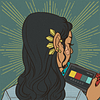Take a photo of a barcode or cover
A mere 294 pages, Plath's novel is all about thoughts and perceptions, never feelings. Well-educated, and sharp as a needle when the need to be comes, Esther's musings are crisp and precise, often using words that one rarely hears spoken or even read. Yet, when she finds herself trapped underneath her metaphorical bell jar, they slowly grow and become unclear, blurry, which I believe is a clever way to showcase the protagonist spiralling down into emptiness, to the point where she contemplates killing herself with a kind of ease that's unnerving.
With such praises, you'd think I would admit to liking this book. Well... we all have an unpopular opinion, right? A beloved book we dislike?
This is mine. And yes, I have an explanation as to why this does not work for me.
Plath's presence aside, there is something else that you have to address when talking this book. Because it is everywhere and inescapable, particularly with pages 197 to 199 as its apex:
The rampant racism and homophobia.
The Bell Jar was written in the second half of the 20th century, in the midst of the Civil Rights movement. The March on Washington took place in the same year as this book's publication. Among legitimate intellectual and/or progressive circles of the time, this manner of thinking is grotesquely out of line. It seems especially absurd in the face of Plath's dogged dedication to the Rights Of Women. Feminism is important, of course, but reading about how the greatest social issue in Plath's eyes (or the eyes of Plath's self-insert protagonist) was women being able to be writers and editors with as much ease as they could be secretaries (as opposed to the several editors and writers there were) is difficult to understand, or sympathize with. Employment can be a crucial issue for women, for tons of reasons, but you ought to wonder about the limits of Plath's feminism, and how it can even be used to harm men of color, as well as other women of color.
And not only is it racist, it's homophobic as hell. And as a half-white, half-arab lesbian, you can imagine I did not have a good time reading this. It's well written, sure, and that fig paragraph does perfectly express depression, but this is like one of those cheap candies: pretty wrapping, disgusting taste.
All in all, would I recommend it? Unfortunately no, if only because it has terribly aged, and the rampant racism and homophobia making it a book I was happy to read but would never want to read again, for obvious reasons.
This was, once again, borrowed from the BANQ (Bibliothèque et Archives Nationales du Québec) in an attempt not to support the author, in spite of her passing many years ago. And while I wish I could say it was a long time ago, I cannot.
My grandfather was born in May 1934, two years after Plath herself. He currently is residing in Lebanon, in his family's home, spending his time reading and taking walks. And it puts everything into perspective for me.
I hate the whiteness of the 'disaffected woman' genre. I hate what this book represents. And if you think I'm talking through my hat, I suggest you read "The unbearable whiteness of the 'disaffected young woman' genre" by Heven Haile, which explains my thoughts better than I ever hope to, or could. Google it: you'll thank me later.
Graphic: Homophobia, Racial slurs, Racism, Suicidal thoughts, Suicide, Suicide attempt
Graphic: Chronic illness, Death, Fatphobia, Homophobia, Mental illness, Racial slurs, Racism, Self harm, Sexual content, Suicidal thoughts, Suicide, Medical content, Medical trauma, Suicide attempt, Pregnancy, Lesbophobia
Graphic: Mental illness, Racial slurs, Self harm, Sexual assault, Suicidal thoughts, Suicide, Religious bigotry, Suicide attempt, Injury/Injury detail
Moderate: Body shaming, Death, Fatphobia, Homophobia, Racism, Forced institutionalization, Lesbophobia
Graphic: Body shaming, Fatphobia, Mental illness, Racism, Sexual assault, Suicidal thoughts, Blood, Vomit, Suicide attempt
Moderate: Death, Drug use, Homophobia, Infidelity, Self harm, Suicide, Forced institutionalization, Medical content, Medical trauma, Lesbophobia
Minor: Child death, Racial slurs, Sexual content
Graphic: Mental illness, Suicidal thoughts, Suicide attempt
Moderate: Racism, Rape
Minor: Homophobia
Graphic: Death, Misogyny, Rape, Self harm, Sexism, Sexual assault, Sexual violence, Suicidal thoughts, Suicide, Forced institutionalization, Blood, Medical content, Suicide attempt, Sexual harassment
Minor: Body shaming, Fatphobia, Homophobia, Blood, Vomit, Classism
Graphic: Mental illness, Self harm, Suicidal thoughts, Suicide attempt, Schizophrenia/Psychosis
Moderate: Racial slurs, Forced institutionalization, Blood, Medical content, Medical trauma, Sexual harassment
Minor: Chronic illness, Confinement, Death, Gore, Homophobia, Misogyny, Rape, Sexism, Sexual assault, Sexual violence, Grief, Death of parent, Pregnancy, Alcohol
Graphic: Death, Mental illness, Rape, Self harm, Sexual assault, Sexual violence, Suicidal thoughts, Suicide, Forced institutionalization, Medical content, Medical trauma, Suicide attempt, Sexual harassment, Injury/Injury detail
Moderate: Body shaming, Homophobia, Racial slurs, Racism, Blood, Lesbophobia, Alcohol
Graphic: Body shaming, Death, Mental illness, Racial slurs, Racism, Self harm, Sexism, Sexual assault, Sexual content, Suicidal thoughts, Suicide, Blood, Medical content, Medical trauma, Suicide attempt, Alcohol, Sexual harassment
Moderate: Homophobia, Lesbophobia
I fell in love with Sylvia Plath's prose style, because this book is a masterpiece.
Graphic: Self harm, Sexual assault, Suicide
Moderate: Homophobia, Racism






